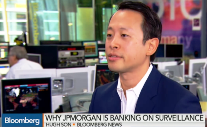MarketsMuse.com Tech Talk update profiles the latest development regarding Overstock.com’s CEO Patrick Byrne plan for a cryptosecurity trading system “for brokerdealers” only and akin to the array of ECNs and ATS platforms that Fintech aficionados and broker-dealers are already accustomed to.
The headline:
Overstock looks to issue Bitcoin-style stocks via new trading system; may issue up to $500 million in stock through blockchain-style technology
Overstock, the online retailer building a crypto-securities exchange, has revealed that it may issue up to $500 million in stock through blockchain-style technology.
Last year Overstock CEO Patrick Byrne hired developers and lawyers in an effort to create a platform – dubbed ‘Medici’ – that could use the core blockchain technology to create a cryptosecurity trading system, in which computer algorithms are used to trade virtual stocks issued by public companies.
The firm has now filed a prospectus related to the sale of securities with the Securities and Exchange Commission, adding: “We may decide to offer any of the securities described in this prospectus as digital securities, meaning the securities will be uncertificated securities, the ownership and transfer of which are recorded on a cryptographically-secured distributed ledger system using technology similar to (or the same as) the distributed ledger technology used for trading digital currencies.”
The prospectus says that these digital securities would not be traded on any existing exchange but on a specific system registered with the SEC as an ATS open only to subscribers that agree to trade exclusively through vetted broker dealers.
For the full story from Finextra.com, please click here













